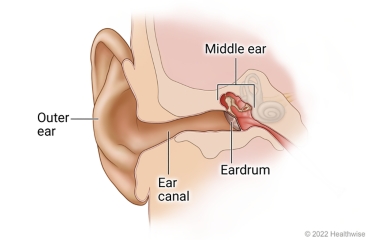
Overview
An ear infection may start with a cold and affect the middle ear (otitis media). It can hurt a lot. Most ear infections clear up on their own in a couple of days and do not need antibiotics. Also, antibiotics do not work against viruses, which may be the cause of your infection. Regular doses of pain relievers are the best way to reduce your fever and help you feel better.
Follow-up care is a key part of your treatment and safety. Be sure to make and go to all appointments, and call your doctor if you are having problems. It's also a good idea to know your test results and keep a list of the medicines you take.
How can you care for yourself at home?
- Take pain medicines exactly as directed.
- If the doctor gave you a prescription medicine for pain, take it as prescribed.
- If you are not taking a prescription pain medicine, take an over-the-counter medicine, such as acetaminophen (Tylenol), ibuprofen (Advil, Motrin), or naproxen (Aleve). Read and follow all instructions on the label.
- Do not take two or more pain medicines at the same time unless the doctor told you to. Many pain medicines have acetaminophen, which is Tylenol. Too much acetaminophen (Tylenol) can be harmful.
- Plan to take a full dose of pain reliever before bedtime. Getting enough sleep will help you get better.
- Try a warm, moist washcloth on the ear. It may help relieve pain.
- If your doctor prescribed antibiotics, take them as directed. Do not stop taking them just because you feel better. You need to take the full course of antibiotics.
When should you call for help?
Call your doctor now or seek immediate medical care if:
- You have new or increasing pain.
- You have new or increasing pus or blood draining from your ear.
- You have a fever with a stiff neck or a severe headache.
Watch closely for changes in your health, and be sure to contact your doctor if:
- You have new or worse symptoms.
- You do not get better after taking an antibiotic for 2 days.
Where can you learn more?
Go to http://www.healthwise.net/patientEd
Enter G862 in the search box to learn more about "Ear Infection (Otitis Media) in Teens: Care Instructions".
Current as of: September 27, 2023
Author: Healthwise Staff
Clinical Review Board
All Healthwise education is reviewed by a team that includes physicians, nurses, advanced practitioners, registered dieticians, and other healthcare professionals.

